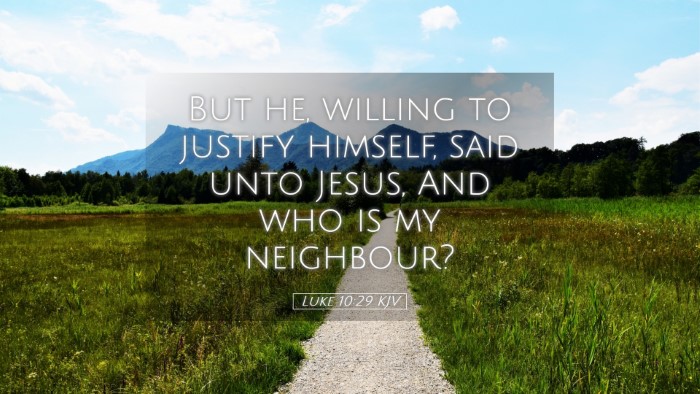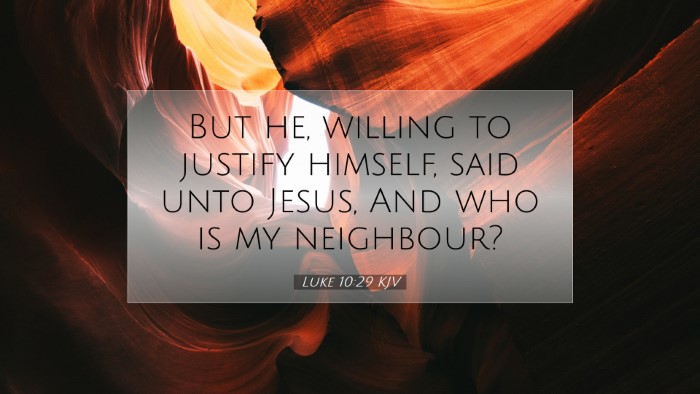Commentary on Luke 10:29
Luke 10:29: “But he, wanting to justify himself, said to Jesus, ‘And who is my neighbor?’”
Introduction
This verse is a pivotal moment in the dialogue between Jesus and the lawyer, setting the stage for the parable of the Good Samaritan. Jesus’ response to the lawyer’s question helps delineate the essence of neighborly love and challenges conventional understandings of community and compassion.
Understanding the Context
In the preceding verses, a lawyer approaches Jesus with a question aimed at testing Him. The lawyer’s desire to justify himself is indicative of a broader human tendency to seek definitions and clauses that exempt us from the moral obligations we have towards others.
Matthew Henry notes that the lawyer's inquiry, while seemingly sincere, reflects a heart prepared to evade the true demands of the law and the spirit of neighborly love.
The Desire to Justify Oneself
The lawyer’s intent to “justify himself” reveals a critical perspective on the human condition. It draws attention to the tendency within individuals to seek validation and comfort in their interpretations of righteousness, rather than embracing the heart of God's law.
Albert Barnes points out that such self-justification often leads to a narrowing of one’s understanding of morality. By defining “neighbor” too narrowly, one can simultaneously limit the call to love and the extent of one’s responsibility to others.
Adam Clarke elaborates on this idea, suggesting that the act of seeking to establish a limited definition of “neighbor” can serve to justify indifference towards those outside of that definition, thus undermining the very foundation of Christian love.
The Question of “Who is My Neighbor?”
The lawyer's question, “And who is my neighbor?” invites a profound exploration of the concept of neighborliness. Rather than providing a straightforward answer, this question indicates a reluctance to engage with the ethical challenge of the law.
Matthew Henry observes that by asking about the identity of the neighbor, the lawyer displays a desire for legalism over genuine compassion. Jesus, in response, shifts the focus from a defined demographic to a lived experience of love toward others, thereby expanding one's moral responsibility.
Albert Barnes emphasizes that this question is essential, as it exemplifies how humanity often attempts to shrink the scope of divine law to avoid the burden of moral duty. It is a perennial question that resonates across ages and cultures, reminding us of the inherent challenges of inclusive love.
Theological Implications
The verse invites deep theological reflection on the nature of love and community. In asking “who is my neighbor?”, the lawyer characterizes the relational dynamics dictated by cultural boundaries, but Jesus invites a radical understanding that transcends these limitations.
As Adam Clarke elucidates, true neighborliness is marked by acts of mercy and compassion, reflecting God’s love toward humanity. This perspective shifts the focus from mere legal adherence to the fundamental ethos of love that should govern the believer's interactions.
Practical Applications
For pastors, students, and theologians, this passage serves as a reminder of the imperative call to embody love in all relationships, extending beyond traditional boundaries. The call to be a neighbor is a call to action, prompting one to seek ways to serve and support those who are marginalized or suffering.
-
Expanding One's Circle: We are challenged to recognize that every person we encounter bears the imago dei and, thus, warrants love and respect.
-
Affirming Responsibility: The question forces us to confront our default positions of indifference towards those outside our community, urging us to cultivate genuine concern.
-
Active Compassion: In fulfilling the command to love one’s neighbor, believers are compelled to engage proactively in acts of kindness, advocacy, and support.
Conclusion
The question posed in Luke 10:29 is deceptively simple, yet it holds profound implications. As believers, we are challenged to move past the confines of our comfort zones and to embrace a radical neighborliness that mirrors the heart of Christ.
Through the lens of the responses from Matthew Henry, Albert Barnes, and Adam Clarke, this verse invites us to explore the depths of what it means to truly love our neighbor — and, in doing so, fulfill the law in its highest intent.


